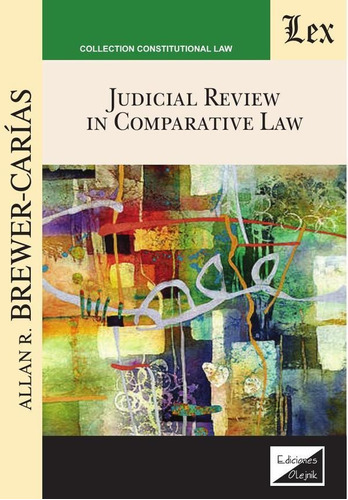Judicial Review In Comparative Law - Allan R. Brewer-carias
en 10 cuotas de sin interés
Vendido por BIBLIOSTORE URUGUAY
+10mil Productos
+500
Ventas concretadas
Brinda buena atención
Entrega sus productos con demora





Características del producto
Características principales
Autor | ALLAN R. BREWER-CARIAS |
|---|---|
Idioma | Español |
Editorial del libro | EDICIONES OLEJNIK |
Tapa del libro | Blanda |
Otros
Cantidad de páginas | 442 |
|---|---|
Peso | 672 g |
Género del libro | Derecho |
Código IBIC | L |
IBIC | DERECHO |
Descripción
MERCADOLIBROS UY
DATOS IMPORTANTES
- Libro 100% original
- STOCK DISPONIBLE!
Listo para retirar o despachar en 72hs hábiles desde que se confirma la compra
- NO se aceptan cambios ni devoluciones
- Coordinar la entrega y abonar el costo del libro + envío (si necesita) para confirmar la compra
- SOLO aceptamos MercadoPago (todas las tarjetas + Abitab y RedPagos)
ENTREGA
- DESPACHO GARANTIZADO en 72hs hábiles
Desde el día de confirmación de compra
- Pick up GRATIS en zona centro, cerca de plaza independencia
- Envíos a todo el país
Consulte costo de envío según la zona de entrega
- Comunicarse por mail o whatsapp para coordinar entrega, recuerde que no se confirma la compra hasta no acordar la entrega
- Para costo de envío aceptamos Abitab, RedPagos, transferencias BROU y Scotiabank
------
JUDICIAL REVIEW IN COMPARATIVE LAW
- ISBN: 9789563929737
- Editorial: EDICIONES OLEJNIK
- Autor: ALLAN R. BREWER-CARIAS
- Tamaño: 230x160x23mm
- Peso: 672gr
- Páginas: 442
- País de publicación: VENEZUELA, BOLIVARIAN REPUBLIC OF
- Lenguaje: SPANISH
SINOPSIS
All over the world, in all democratic States, independently of having a legal system based on the common law or on the civil law principles, the courts special constitutional courts, supreme courts or ordinary courts have the power to decide and declare the unconstitutionality of legislation or of other State acts when a particular statute violates the text of the Constitution or of its constitutional principles.
DESCRIPCIÓN
All over the world, in all democratic States, independently of having a legal system based on the common law or on the civil law principles, the courts special constitutional courts, supreme courts or ordinary courts have the power to decide and declare the unconstitutionality of legislation or of other State acts when a particular statute violates the text of the Constitution or of its constitutional principles.This power of the courts is the consequence of the consolidation in contem-porary constitutionalism of three fundamental principles of law: first, the existence of a written or unwritten constitution or of a fundamental law, conceived as a superior law with clear supremacy over all other statutes; second, the rigid character of such constitution or fundamental law, which implies that the amendments or reforms that may be introduced can only be put into practice by means of a particular and special constituent or legislative process, preventing the ordinary legislator from doing so; and third, the establishment in that same written or unwritten and rigid constitution or fundamental law, of the judicial means for guaranteeing its supremacy, over all other state acts, including legislative acts.Accordingly, in democratic systems subjected to such principles, the courts have the power to refuse to enforce a statute when deemed to be contrary to the Constitu-tion, considering it null or void, through what is known as the diffuse system of judicial review; and in many cases, they even have the power to annul the said unconstitutional law, through what is known as the concentrated system of judicial review.The former, is the system created more than two hundred years ago by the Supreme Court of the United States, and that so deeply characterizes the North American Constitutional system. The latter system, has been adopted in consti-tutional systems in which the judicial power of judicial review has been generally assigned to the Supreme Court or to one special Constitutional Court, as is the case, for example, of many countries in Europe and in Latin America. This concentrated system of judicial review, although established in many Latin American countries since the 19th century, was only effectively developed particularly in the world after World War II following the studies of Hans Kelsen.Of course, during the past thirty years many changes have occurred in the world on these matters of Judicial Review, in particularly in Europe and specifi...
